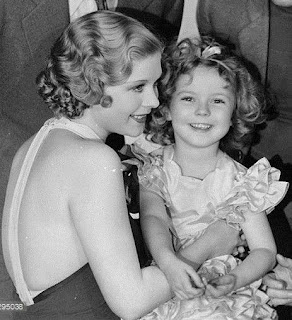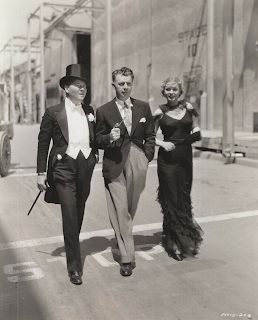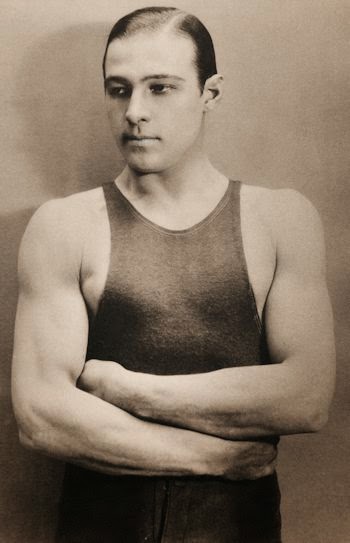The Tragically Short Life and Career of Dorothy Dell
 |
| Lobby Card for Little Miss Marker |
While on a long weekend/mini-break/vacation to LA last month I enjoyed a first viewing of the 1934 film Little Miss Marker. This was a Shirley Temple film that had eluded me all through my childhood (and most of my adulthood) since I cannot remember it ever being in rotation on my local UHF station (google if you are too young to know what a UHF station was). Said station (KBHK) had a weekly Sunday morning line-up of Temple films and Little Rascals shorts to entertain the kids. This programming, no doubt, helped to keep us noisy kids out of parental hair on Sunday mornings. As an aside, in addition to Temple film, our local UHF showed lots of classic Warner Bros., 20th Century Fox, RKO and MGM films to start me on the road to being a real film buff.
In the days long before home video and dvds/blurays early 1930s era Paramount films were rare, if seen at all. In fact, about the only really early Paramount title I recall seeing was Bolero with George Raft and Carole Lombard, and I think that was not until much latter when AMC showed classic films. Nothing pre-1940 for Paramount was in the television packages that I can remember (excepting Fleischer b/w Popeye cartoons). Bob Hope films from the 1940s, yes indeed. I had to wait until I was much older to see and appreciate stars like Carole Lombard or Claudette Colbert.
I was more than pleasantly surprised at how much I enjoyed this film. Knowing the basics of the plot, I had anticipated this would be a maudlin tale as in the later Shirley Temple playbook. I was 100% wrong. This film lacked the cloying sentiment I was expecting. Temple is still young and not quite the sure-shot professional she was just a year later. You can still catch her glancing to her coach (mother Gertrude) on either side of the camera in some shots. There is a naturalness to Temple that shows you exactly why she was so beloved and endearing. The other unusual aspect is Temple is just flat out being a kid, a somewhat streetwise kid, but not the 100% singing and dancing kid you got with most of the Fox films. Her attitude is absolutely charming, spunk and sass without the artificial cute. The normally sophisticated Adolphe Menjou is perfectly cast as Sorrowful Jones. It's a pleasure to see this sloppy bookie (unusual for the traditionally dapper Menjou) warm up to this little imp of a kid.
 |
| Adolphe Menjou and Shirley Temple |
The big surprise to me watching the film is that of leading lady, Dorothy Dell as Bangles Carson who is a torch singer that has a heart of gold. Bangles Carson, what a GREAT character name. I confess, Dorothy Dell was not a name familiar to me. It's no wonder I'd not heard of her, Dorothy Dell made 3 feature films for Paramount before her tragic death in a car accident in 1934. She was in Hollywood for about 8 months!
In Little Miss Marker, it is not only Shirley Temple on the cusp of being a breakout S-T-A-R, it is Dorothy Dell. She has all the warmth and all the vulnerability, qualities that later personified Alice Faye (also tested out at 20th Century Fox in two films in 1936 with Shirley Temple). Dell could sing and she could act. Her scenes with Temple show great warmth, charm and a real connection between the pair. It seems there was a real friendship there.
In a cruel example of Hollywood abuse, Temple later recalled and wrote of in her autobiography Child Star, which I cannot find at the moment, (so please forgive the paraphrasing) how during filming of Now and Forever with Carole Lombard and Gary Cooper in which the director Henry Hathaway used the news of Dorothy Dell's death to get a performance out of the child in which she needed to cry. This was hardly something that was necessary. Temple recalled she cried and cried and ultimately was comforted by Carole Lombard. In a sad irony, Dell had been slated for Now and Forever.
 |
| Dorothy Dell and Shirley Temple between scenes |
Sadly, of her two films I've seen, Little Miss Marker is the best of the lot. While I liked Wharf Angel, she was fine in it, the film was a neutered and warmed over riff on Josef von Sternberg's excellent silent The Docks of New York (1928). Co-directed by George Somnes and William Cameron Menzies, the film is filled with fog and inky black shadows thanks to Menzies and cinematographer Victor Milner. Atmosphere and fog there is aplenty, and I love it. The film was originally slated to have Gary Cooper and Carole Lombard in the leads. Both were too valuable properties for what was essentially a programmer. Once Lombard dropped out, or was removed from the slate, Dorothy Dell got her big break and was cast as Toy, a lady of the pavements, or in this case, the fogbound docks of San Francisco. Cast as rivals for her affection were the beefy Victor McLaglen and Preston Foster. The wonderful scene stealer Alison Skipworth plays Mother Bright the lady who runs the local dive where all the sailors and stokers hang out on shore. The film started shooting January 4, 1934 and was premiering in Westwood on February 25th. Publicity photos for Wharf Angel show Dell in sultry pre-code costumes and poses (not in the final film) looking much like Anna Sten as Nana.
 |
| Publicity as Toy in Wharf Angel (my collection) |
Looking at the trades for Wharf Angel, depending on where it played it either did little business or was a decent draw. Silver Screen noted: The story is rather weakish in this one but the photography and atmosphere are superb. If you have a yen for watherfronts dunked in fog, you'll go for the settings in a big way. Regardless if the film was weak, the consensus in the press seemed to single out Dorothy Dell for praise. As in Picture Play Magazine's review: As soon as you see Dorothy Dell in her first picture you will like her. Shortly afterward you will admire her and before the end you will be enthusiastic. She has the beauty of the "Follies" girl she used to be, the ability of a real actress and a voice that is not only haunting but it is used with the skill of a trained speaker. In short, Miss Dell rings the bell and doors fly open to welcome her to the small company of worthwhile discoveries. The Hollywood Reporter panned it as a "Good Idea Gone Wrong."
Variety gave it a pan, as well. Dorothy Dell was singled out for some faint praise Fans will probably like Dorothy Dell. She is an appealing miss and a good little actress. The part is hokey. Typical Hollywood romanticism about a prostie with a tender heart who changes her profession when a young stranger fleeing from the cops who want him for murder comes into her room and life. Paramount and the powers that be stood up and took notice of this blossoming new star. You can watch Wharf Angel for free over at the Internet Archive.
Little Miss Marker was Dell's second feature for Paramount. Her photo and news stories were showing up in the fan magazines and the trades. This A-picture with new Fox star Shirley Temple on loan-out as Little Miss Marker and favorite Adolphe Menjou was certainly a step up on the ladder of fame. Dell shines here not only as a singer, as an actress whose character looks to be patterned to resemble Mae West at least in looks. Dorothy Dell brings a sophistication that seems to belie she was barely 20 years old in real life. Naturally, the lion's share of reviews are directed to Shirley Temple, and rightly so, she's fantastic. Both Adolphe Menjou and Dorothy Dell received nods saying they both were "oustanding."
 |
| Jack Oakie, director Wesley Ruggles and Dorothy Dell on the Paramount lot during filming Shoot the Works |
Her next film Shoot the Works which starred Jack Oakie was going in to release when she died. Sadly, in a good number of the trade ads for the film in the trade rags, Dorothy Dell's name is omitted in the cast lists. One suspects it was unseemly to advertise for a player who had died. Photoplay's review mentions both Dorothy Dell and Lew Cody The tragic note is the presence of Dorothy Dell and Lew Cody, both excellent, and both now in the land beyond. I have not yet watched Shoot the Works, but, we all can as it is also over at the Internet Archive. Set in showbiz radio-land, I am up for this and will watch it soon so I can round out the terribly short filmography of Dorothy Dell.
In viewing two of her films, as I said above, hers was a star on the ascent. That she had talent no question, she also had star quality, in abundance. One can surmise and hope that she would have aged out of being typecast as a good time girl and into roles more suited or designed for her talent. In the little you can see, I think she would have shined in comedies and could have ended up in a Preston Sturges film or two. Sadly, all we have left are what ifs and it makes me doubly sad we all got cheated, most of all so did poor Dorothy Dell get cheated.
Oh lord, what a tragic tale once I looked around online and read the chapter about Dell in Laura Wagner's book Hollywood's Hard-Luck Ladies: 23 Actresses Who Suffered Early Deaths, Accidents, Missteps, Illnesses and Tragedies. How's this for a corker of a book title? It's a fascinating book and I recommend it, not only for the fleshing out of Dorothy Dell's short life.
Unbelievably tragic that she lost her life barely past 20 years old with such a bright future ahead of her.
I am not going to go into details of the car accident that killed her. The photo below of the crash scene is pretty horrifying alone. You can read about it here at Bizarre Los Angeles which is where I snapped up this terrible photo. Dorothy's funeral services were held on June 10, 1934 and attended by 150 invited guests. Ruth Etting who was a colleague of Dorothy's in the Ziegfeld Follies sang the Rosary at the service. Variety reported there was a crowd of about 1,000 people outside the mortuary. Her parents then accompanied her casket to New Orleans for burial. As well as her parents, she was survived by her younger sister Helen.
 |
| Absolutely horrific crash scene. |
You can see Dorothy Dell's memorial over at Find A Grave.
In additional to Laura Wagner's book linked above, I consulted James Curtis' excellent book on William Cameron Menzies and trolled through the great resource the Media History Digital Library.
I know I've not done Dorothy Dell real justice here in this short recap. I hope, however, that this sparked your curiosity. Watch her films, even a lesser film like Wharf Angel, she's worth it. I am so grateful my Shirley Temple loving friend treated me to seeing Little Miss Marker. Not only for Temple, but, because it clued me in to this talented lady who deserves not to be forgotten, no matter how brief her career was.
 |
| Dorothy Dell Goff 1914-1934 |


Comments